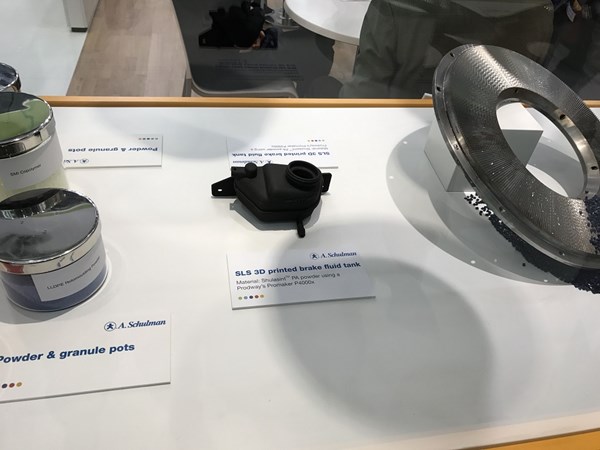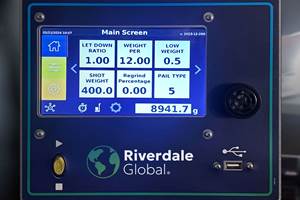K2016 Materials and Additives from Polyscope, A. Schulman and Dow Corning
Polyscope, A. Schulman, Dow Corning highlighted new products and applications along with soon-to-be launched materials and additives.
Polyscope, A. Schulman, Dow Corning highlighted new products and applications along with soon-to-be launched materials and additives.
If you’ve ever attended a K show for the entire duration, you know how tiring it can be, but the saving grace is always the excitement of discovering new technologies and applications.
Within the last 48 hours of K 2016, I had the opportunity to interview three materials and additives companies, and they were all set to launch new products within the coming year.
• Polyscope (U.S. office in Novi, Mich.) showcased the latest in its expanded range of Xiran IZ terpolymers based on styrene, maleic anhydride, and N-phenylemaleimide, for use as heat-booster modifiers of ABS, ASA, PS, and SAN for automotive and appliance components (read more from PT, Sept. 2016). The company has also developed a new SMA copolymer specifically for higher heat PMMA automotive LED applications, as well as exploring non-auto PMMA applications.
Even newer, with no brand name assigned to them as yet, are new SMA copolymers developed as compatibilizers for nylon/ABS and PC/ABS that ensure there is no loss of heat resistance when such resins are blended. These are only the starter products as Polyscope is exploring the use of these copolymers in other resin blends, as well as SMA copolymers that can support both biopolymer compounds and recycled materials.
And, for additive manufacturing, Polyscope is working on developing filaments for FDM 3D printing technology. To be launched within the first half of 2017, the initial offerings will include ABS, which the company says, surpasses existing ABS filaments in terms dimensional stability and adhesion between layers. Filaments for use with SLS technology are also being explored.
• A. Schulman (Akron, Ohio), as was the case with many other materials suppliers, segmented its exhibits by the key market sectors it serves. The company has put a lot of emphasis on its colored compounds technology—color effects, touch, feel, sound—and its new Color Trending Book presents the options available for automotive, appliances, toys, cosmetics, and more.

This year, the company was awarded the grand prize award for a body exterior part by the European section of the SPE Automotive group. The part was an in-mold color (vs. painted) front and rear bumper in a silver color made from PP/nanoparticle TPO.
Since its 2015 acquisition of Chicago-based Citadel Plastics Holdings, the company has been working to bring that acquired knowhow in thermoset composites to thermoplastics. One focus is in long-glass-fiber thermoplastic composites based on PP, nylon, and PBT (with PET as a blend) for structural applications.
The company is exploring both carbon fibers for strength and stiffness and aramid fibers for abrasion resistance. Senior VP and General Manager Heinrich Lingnau told me that, in collaboration with the University of Aachen and IKV, the company is looking at alternative processing techniques for both long glass and carbon fibers, which can break easily during injection molding. “We’re exploring mass-molding technology—ways to insert in-laid carbon fiber tape followed by overmolding, for example.”
Further on composites, Lingnau says the company is aiming to bring its Quantum Engineered Structural composites (ESC) thermoset-carbon fiber sheet technology to thermoplastics. “We have developed thermoplastic powders and are looking to marry these with the sheet technology to make organosheets.”
A.Schulman is also making progress toward commercialization of its Schulasint nylon 12 powders for SLS additive manufacturing.
• Dow Corning (Midland, Mich., now part of Dow Chemical), discussed the commercial expansion of its two-year-old patented silane-based reinforcement technology that is said to bring PP up to nylon performance.
Company representatives also discussed their new, high-molecular-weight, long-chain, non-migratory silicone slip agent specifically developed for L/LLDPE for fill-form-seal film food packaging, launched this year. In the works for introduction next year is a silicone-based slip agent specifically developed for improving BOPP film processing.
Dow Corning has been selling to compounders, particularly of PC, a silicone that acts as both a flame retardant (non-drip with excellent charring) and a chain extender. PolyOne has found it to be effective in its PP/wood fiber compounds. In 2017, a similar product that is specifically tailored to nylons 6 and 66 will be ready for launch.
Related Content
Tosaf’s Investments in North America Result in 40% Increase in Production Capacity
Backed by a global presence, Tosaf provides localized additive and color solutions, and services for the plastic industry in North America.
Read More‘Eco-Friendly’ Foaming Agent Masterbatch
CAI Performance Additives’ ST-BA13MB boasts reliable foaming results across various volume thermoplastics
Read MoreRiverdale Global Showing Latest Innovations and New Satellite Location in Wisconsin
NPE2024: Live demos of updated RGS controller are among the highlights at its Wisconsin facility that will house the ‘new’ color R&D lab.
Read MoreBASF Highlighting How They 'Make, Use and Recycle Future Solutions'
NPE2024: BASF is using its proprietary computer-aided engineering tool Ultrasim when designing for sustainability in a broad range of industries.
Read MoreRead Next
See Recyclers Close the Loop on Trade Show Production Scrap at NPE2024
A collaboration between show organizer PLASTICS, recycler CPR and size reduction experts WEIMA and Conair recovered and recycled all production scrap at NPE2024.
Read MoreMaking the Circular Economy a Reality
Driven by brand owner demands and new worldwide legislation, the entire supply chain is working toward the shift to circularity, with some evidence the circular economy has already begun.
Read More











